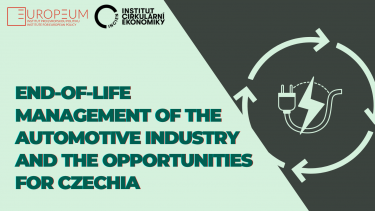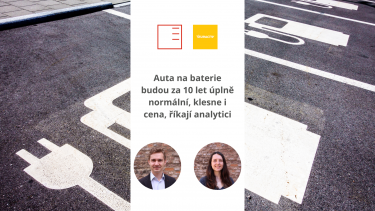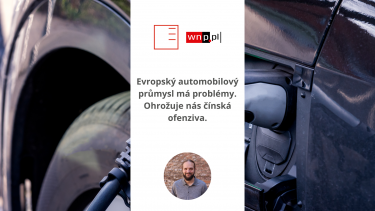Policy Paper | Securing Europe’s Lithium Future: The Cinovec project and sustainable lithium mining
The EU's proactive stance, introduced in the Critical Raw Material Strategy and later Critical Raw Materials Act (CRMA), drives the EU approach to secure the supply of European/domestic critical raw materials for EV battery production. The Cinovec project has a large economic potential as it enhances the ability to secure domestic and regional supply of lithium, which is otherwise very geographically concentrated outside of Europe. Europe relies on a handful of countries, particularly China, for the import of lithium for the production of EV batteries.
Show moreHospodářské noviny | Czech lithium reserves could boost the automotive industry
The Czech Republic has vast reserves of lithium, a crucial resource for manufacturing batteries for electric vehicles. However, it lags behind in other aspects of the battery supply chain, such as production and recycling. And yet, these key industry sectors could potentially help in saving the local automotive industry. Jonathan Lyons, an analyst at the EUROPEUM Institute, further explored this issue and the potential benefits of lithium for the Czech economy in an article for Hospodářské noviny.
Show moreEnd-of-life management of the automotive industry and the opportunities for Czechia
After three successful projects focusing on the decarbonization of the Czech automotive industry, the Green Europe team of EUROPEUM in collaboration with the Institute of Circular Economy (INCIEN) is broadening its focus and taking a more circular approach. This project will focus on better lifecycle and end-of-life management of materials used in vehicles and batteries. The collaboration will be split into two research areas.
Show more

REPORT | EU-Pacific Talks: In-EV-itable future of automotive industry: what is the role of the Pacific region
In the last debate of the second series of EU-Pacific Talks, organised by EUROPEUM Institute for European Policy, the guests focused on electric and fuel cell vehicles, which are envisaged as a way to decarbonise road transport. Read what our guests discussed in this report by Petra Pospíšilová.
Show moreThird year | Decarbonisation of the Czech automotive industry
The climate team of EUROPEUM is currently delivering the 3rd year of its project focused on the decarbonisation of the automotive industry in the Czech Republic. We want to build upon our experience and move this work forward with a more targeted approach. We will focus on three main areas, which we have identified as crucial parts of the puzzle for transitioning to cleaner modes of transport.
Show more

Policy Paper | The future is electric: role of Visegrad countries in the EV battery supply chain
The car industry is a crucial player for the economies of each Visegrad country, but to remain competitive adaptation is necessary. Since the shift from ICE to EVs leads to a substantial need for Critical Raw Materials (CRM), the V4 countries have and must continue to position themselves along the different parts of the EV battery supply chain from mining, refining to manufacturing, reuse and recycling as well as R&D into new battery chemistries. The future is electric: role of the Visegrad countries in the EV battery supply chain report addresses areas for Visegrad countries to ensure a sustainable and reliable EV battery supply chain.
Show more PDF
iDNES.cz: Cheap electromobility has been pushed back by Brussels. Batteries must be eco
Electric cars that do not emit dangerous emissions should slowly replace cars with combustion engines. An environmentally friendly replacement. But what about the production of their batteries? According to the EU, the entire life cycle of these batteries should be environmentally friendly, from production to use to disposal. What measures will be introduced, how will the sale of batteries be regulated and how will this affect their price? Our research fellow Michal Hrubý comments on the topic.
Show moreEURACTIV.cz | Battery-powered cars will be normal in 10 years' time, prices will fall, say analysts
On the occasion of the conference E-mobility: the Opportunity for Central Eastern Europe, a podcast has been created with our senior researcher Kateřina Davidová and researcher Michal Hrubý as guests. For example, they answer the following questions: Where does Europe stand with the development of electromobility today? Where to find the money for electrification?
Show more
WNP.PL: The European car industry is in trouble. Chinese offensive threatens us.
Until a few years ago, Chinese cars were considered to be copies of European or American cars. Today, China is the largest automotive market, including in the electric car segment, and Chinese manufacturers want to establish themselves in Europe. Our research fellow Vít Havelka commented on this situation.
Show more
iDNES.cz: China's electric car wave will overwhelm Europe, warns analysis
The driving force of the electric car market is no longer Europe or the United States, but China. It is now trying to push its production into Europe, but the European current production infrastructure is not capable to face the challenge. While the debate about electric cars is mainly limited to environmental friendliness and price for consumers, the future of global competition is often neglected. This is what our researchers Vít Havelka and Michal Hrubý point out in a new analysis on electromobility. To safeguard its automotive industry, Europe needs to work on improving its battery production capacities, as well as its supply chains for primary raw materials, the experts say.
Show more
Staroměstské náměstí 4/1
Prague 1 - Staré Město
110 00
tel.: +420 212 246 552
email: europeum@europeum.org
https://www.europeum.org









